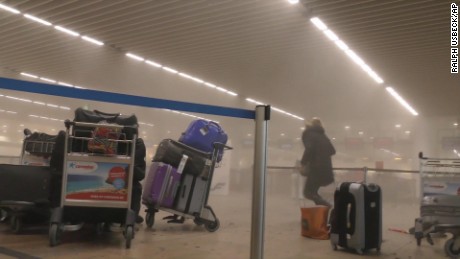
President Barack Obama, currently in Cuba on a foreign trip, said the U.S. "will do whatever is necessary to support" Belgium.
"This is yet another reminder that the world must unite. We must be together regardless of nationality or race or faith in fighting against the scourge of terrorism," he said at the top of a speech more broadly focused on Cuba.
Story highlights
- A U.S. official speculates ISIS is "trying to make an international statement" by attacking the home of NATO, the EU
- Witnesses say Belgian police special forces are coming through the Brussels neighborhood of Schaerbeek
- Two explosions rock Brussels Airport, another rips through a subway station in the Belgian capital

Now Playing Video shows aftermath of...
(19 Videos)
Story highlights
- A U.S. official speculates ISIS is "trying to make an international statement" by attacking the home of NATO, the EU
- Witnesses say Belgian police special forces are coming through the Brussels neighborhood of Schaerbeek
- Two explosions rock Brussels Airport, another rips through a subway station in the Belgian capital
ISIS claimed to strike yet again on European soil Tuesday, saying its "fighters" launched attacks on the airport and a subway station in Belgium's capital that killed at least 30 people and wounded about 230 more.
While jarring, the carnage wasn't altogether surprising. Belgium has been going after terrorist threats for months, as illustrated by last week's capture of Europe's most wanted man, Salah Abdeslam, in a bloody raid in Brussels.
"We were fearing terrorist attacks," Belgian Prime Minister Charles Michel told reporters Tuesday. "And that has now happened."
A Belgian government representative told CNN that 20 people died at the Maelbeek metro station and 130 were wounded, plus 10 more were killed and 100 wounded at Brussels' international airport.
The "working assumption" is that the attackers came from the same network behind November's massacres in Paris, which left 130 dead, Belgian security sources said, while cautioning it is very early in the latest investigation.
After Tuesday's attacks, Belgian state broadcaster RTBF reported that Belgian authorities carried out midday raids in a search for people linked to the attacks. Several witnesses told CNN they'd seen police special forces combing through the northeast Brussels neighborhood of Schaerbeek, cordoning off a train station there.
Belgian authorities have given their U.S. counterparts pictures of three possible attack suspects, a U.S. law enforcement official said. None of the men, who were shown pushing luggage carts, has been identified by name, nor was it immediately known if any attackers are at large.
ISIS -- as it has for other terrorist attacks in Europe, Asia and Africa -- embraced all the assailants. Its claim noted that Belgium is "participating in the international coalition against the Islamic State." In fact, Belgian warplanes flew 796 sorties and launched 163 airstrikes over Iraq from September 2014 to July 2015, according to the U.S.-led anti-ISIS coalition, and were set to resume these operations this summer.
And the extremist group may not be done. One Twitter post widely circulated by prominent ISIS backers featured the words, "What will be coming is worse."
A senior U.S. official thinks it's no coincidence that ISIS would want to strike in Brussels, home to the headquarters of NATO and the European Union.
"They are trying to make an international statement," the official said. "They aren't stupid."
'It was a matter of time'
Belgium is no stranger to terror. A U.S. counterterrorism official said, "The Belgians have been sitting on a ticking time bomb," given all those who have gone from the small European nation to Syria and Iraq to join ISIS, then possibly come back home.
Still, these facts don't take away the shock and horror of those who lived through Tuesday's carnage.
"You cannot believe it; you cannot believe it," said Jef Versele, who was in the airport's departure hall when bombs exploded there. "It was so insane. Not in my backyard."
At least one of the two airport explosions was a suicide bombing, Belgian federal prosecutor Frederic Van Leeuw said. A blast happened there outside the security checkpoints for ticketed passengers and near the airline check-in counters, an airline official briefed on the situation said.
The subway station blast happened in the Brussels district of Maelbeek, near the European Quarter, where much of the European Union is based.
Richard Medic, who arrived at the metro station shortly after that explosion, wasn't surprised by the carnage after all that Europe has gone through recently, including November's massacre in Paris that ISIS claimed responsibility for.
"I think, after the Paris attacks, we were assuming something like this would happen," the Brussels resident told CNN. "And it was a matter of time."
Yet Versele, the airport witness, said that he thinks Belgians should not hole themselves up.
Instead, he said, they should continue to live their lives and travel "to prove that we're not afraid of those who have done (the attacks)."
Two nuclear power plants evacuated
Belgian authorities bolstered security after Tuesday's attacks, including shutting down all Brussels metro stations and evacuating the city's airport.
This comes as the terror threat level in Belgium went up to four -- its highest. That step-up means that army soldiers can be sent onto the streets to meet security needs.
No flights will go into or out of Brussels Airport -- which CEO Arnaud Feist said was "shot in the heart" -- until at least noon Wednesday, according to Belgium's crisis center. Several of the city's top shopping centers closed for Tuesday and perhaps beyond, according to broadcaster RTBF, while public transit shut down temporarily. Train stations reopened at 4 p.m. "with extra security measures."
All but essential staff were sent home from two nuclear power plants in Belgium -- one in Tihange and the other in Doel, said a representative of Engie, the French company that operates the facilities. Belgian authorities ordered this evacuation, though the representative did not provide further details.
And RTBF reported that the National Pensions Office in Brussels was cleared after two suspicious packages were found inside.
The effects of Tuesday's attacks have been felt outside the Belgian capital as well.
As far away as the United States, authorities in places like New York, Washington, Chicago and Los Angeles took special precautions like increased K9 sweeps of subways and additional police patrols. This was especially true around airports, subway stops and train stations, with scenes like those in the U.S. capital -- where police pulled out and checked travelers at random -- not uncommon.
"This is yet another reminder that the world must unite," U.S. President Barack Obama said from Cuba, where he's on a historic visit. "We must be together regardless of nationality or race or faith in fighting against the scourge of terrorism."
European calls for solidarity
NATO, the military alliance that calls Brussels home, increased its own alert level and expressed solidarity with Belgium.
"This is a cowardly attack, an attack on our values and on our open societies," NATO Secretary General Jens Stoltenberg said in a statement. "Terrorism will not defeat democracy and take away our freedoms."
As in other places, British authorities ordered an increased police presence at ports, airports, Tube stations and international train stations, said Prime Minister David Cameron.
Eurostar, a high-speed railway that goes to England and France, noted a number of schedule and other changes, including canceling service between London and Brussels.
Throughout France, 1,600 more police hit the streets after the Brussels attacks, French Interior Minister Bernard Cazeneuve said.
"I express my entire solidarity with the Belgian people," French President Francois Hollande tweeted. "Through the Brussels attacks, the whole of Europe has been hit."
That sentiment was echoed by Belgium's Michel during what he called "a dark time for our country."
"More than ever, I call on everybody to show calm, but also solidarity," the Prime Minister said. "We are facing a difficult, challenging time. And we should face up to this challenge by being united."
Airport witness: Windows broken, ceiling parts down
That darkness set in soon after sunrise, around 8 a.m. Alphonse Lyoura was doing his job handling bags at Brussels Airport when, he said, he heard someone speaking and then "a huge, strong explosion."
"It's horrible," he told CNN affiliate BFM, recalling a man who'd lost both legs and other grisly scenes. "Belgium doesn't deserve this."
In the departure hall, Versele noticed "people ... shouting and running around" after the first blast, then even more pandemonium after the second explosion, which was, "in my eyes, much more powerful."
CNN Map




























Brussels airport
Maalbeek station
That blast blew out windows, created a lot of smoke and caused parts of the ceiling to fall, he added.
"People were on the floor," Versele said, estimating he saw 50 to 60 people on the floor seemingly unable to walk. "... It was quite a mess."
Traveler Jeffrey Edison had cleared security and was near the gate, several hundred yards from the departure lounge, where the explosions occurred. He told CNN he didn't hear the blasts but "suddenly saw" 200 to 300 people rushing toward him from the security checkpoint. He estimated that passengers didn't find out what was going on for about 25 minutes.
Anthony Barrett watched it unfold from his hotel across from the terminal building.
"When I opened the curtains and looked out, I could see people fleeing," he told CNN -- some of the wounded being carried out on stretcher after stretcher, others on luggage trollies.
Officials have not yet named those killed or wounded. The injured at the airport do include three Mormon missionaries -- ages 19, 20 and 66 -- from Utah, according to the Church of Jesus Chris of Latter-day Saints.
Soccer star: 'I wish for Brussels to act with dignity'
About an hour later, during the tail end of Brussels' rush hour, another blast went off at the Maelbeek metro station.
Sander Verniers was heading toward there when this explosion occurred, producing "strong winds going (through his train) and some noises that shouldn't be there." Belgian troops met the passengers as they got off the train and walked along the tracks.
"We all had to get out," Verniers told CNN. "There was a lot of smoke."
The Belgian crisis center tweeted that all public transportation in the city has been closed.
"Stay where you are," it said.
Kristalina Georgieva, the vice president of the European Commission, said that all the organization's institutions are at "alert level orange" and that all meetings on its premises and outside have been canceled. She advised people to stay at home or indoors.
Abdeslam -- who reportedly confessed to have been involved in last fall's Paris terror attacks, which ISIS claimed responsibility for -- was arrested in the Brussels suburb of Molenbeek on Friday. Belgium's Prime Minister deflected a question about whether there's any link between Tuesday's bloodshed and Abdeslam's capture, saying it is too early to tell.
He said Tuesday that he had "no information" about who was responsible for the attack, adding that authorities will find that out, but right now their focus is on caring for the victims.
Belgian national soccer team captain Vincent Kompany tweeted that he was "horrified and revolted (that) innocent people (are) paying the price again," but he urged people not to encourage those wishing to lash out.
"We must reject hate and its preachers," Kompany said. "... I wish for Brussels to act with dignity."















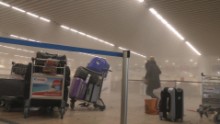
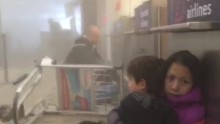
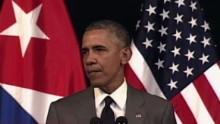
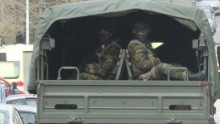
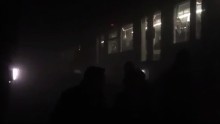
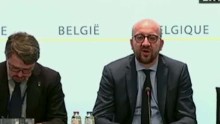



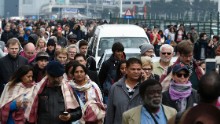


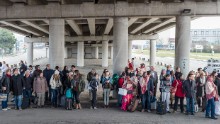
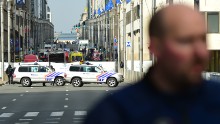
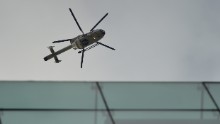
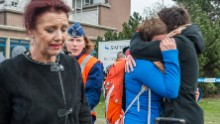
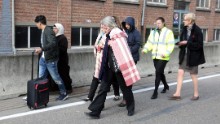
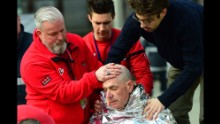
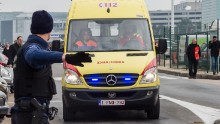
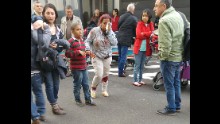
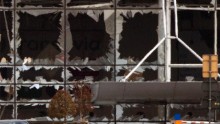
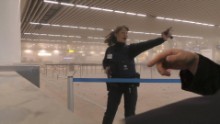
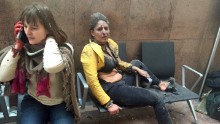
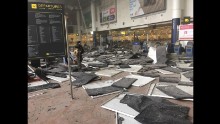
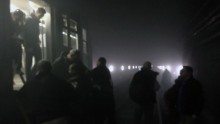
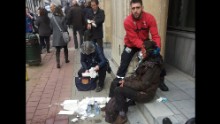
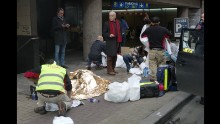
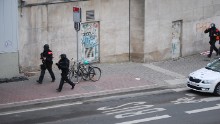
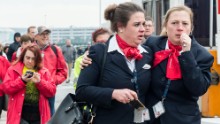

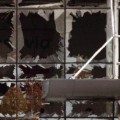
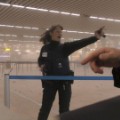
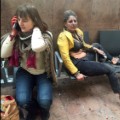
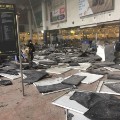
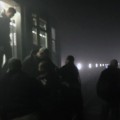
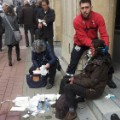
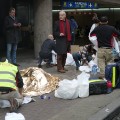


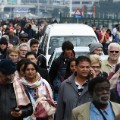


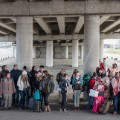

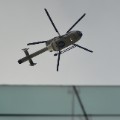
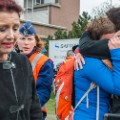
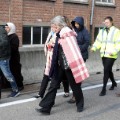
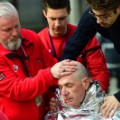
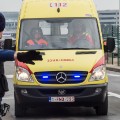
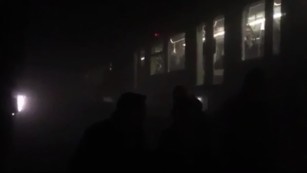
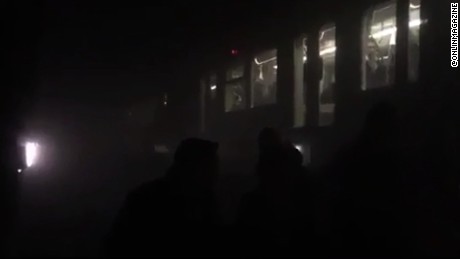










No comments:
Post a Comment